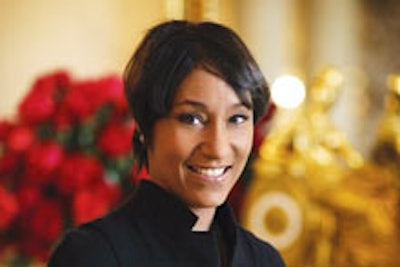
More than a week after Tareq and Michaele Salahi successfully crashed a White House state dinner for Indian Prime Minister Manmohan Singh, public scrutiny has shifted from the Secret Service to the East Wing. Social Secretary Desirée Rogers—already one of the administration's higher-profile employees—has been criticized by television pundits, columnists, and bloggers because the incident occurred at a dinner she planned. So what do event professionals think? Although they're divided on whether Rogers should retain her position, many seem to think she needs to reevaluate her methods.
The criticism paints her as an inactive employee, failing to properly staff the gate and check-in area or coordinate with the Secret Service, and taking a seat at the dinner while the crashing transpired.
"The standard to go by is Ann Stock, the social secretary for the first four years of the Clinton administration," said Chuck Conconi, publicity and events counselor for Qorvis Communications in D.C. and a former Washington Post columnist. "When she went to events, she was working. It's easy to get caught up in the glamour of the White House and forget you are there to work. Desirée has become one of the celebrities of the administration, and that's a difficult position to be in."
Gracing the cover of WSJ (the magazine of The Wall Street Journal) and Capitol File, sitting beside Anna Wintour at New York Fashion Week, and infamously referring to the "Obama brand" have all made her something of an easy target. And after the initial shock of learning that uninvited guests got an audience with the president wore off, columnists and talking heads were quick to turn the conversation to the high-profile White House staffer.
In June, Rogers spoke about her new position—and her access to the Commander in Chief—to a crowd of 100 or so entertainment industry types and journalists at the annual meeting of the Creative Coalition, inside the posh screening room of HBO's Sixth Avenue headquarters. "I have three morning meetings: first with the president in the West Wing, next with the special events teams and house staffers, and third with the first lady in the East Wing," she said then. "The job comes with lots of logistics. I'm essentially working in a house that is someone's home. But it's also a museum, an office, there are tours. Lots of coordination goes on to make sure things end and begin when they need to."
When asked at the time what she does with event crashers, Rogers replied (to much laughter), that she's begun adding an extra table, row, or bench to every event she produces, as each time she found extra people would show up in hopes of gaining entrance. "Lots of people just come anyways, they won't take no for an answer," she said in June. "Finally I just said, 'Alright, come on in, it's no use kicking you out.'"
So far, she has remained silent on the subject of her first state dinner, leaving others to speculate on her job performance. "It's a game of telephone," said planner and designer Carolyn Bakula of New York-based firm Bakula Design. "We're only able to tell what the media is saying, but she should have been running the show, up in the front. The fact that no one from her staff was at check-in doesn't even seem possible. There's so much at stake at events like these."
Change seems key, but most of the planners we asked about the situation don't feel Rogers should be pushed out the door just yet. "She's a high-level confidant to the president and Mrs. Obama and has value and responsibilities beyond this incident," said Los Angeles planner Cara Kleinhaut. "But there was clearly a major breakdown on her team, and the lead on her staff for check-in and list management should be replaced for sure."
The most contentious point in the criticism of Rogers doesn't seem to be the front of house, where the breakdown in protocol took place. Rogers's decision to be seated at a dinner she planned is what has many planners shaking their heads.
"I have never sat down at an event that I'm planning, ever," said Annette M. Suriani, director of meetings at Meetings Management Group in Virginia and a member of the board of directors of the Professional Convention Management Association. "The more I hear and the more I read, the more I think she should resign. We're not talking about an association convention here, we're talking about the president of the United States. We're talking about national security. To not have your own people posted at various entryways, to me, is a dereliction of duty."
This particular social secretary serves an important purpose as a seated guest, according to New York event planner Bronson van Wyck, who worked at the State Department during the Clinton administration and on events around George W. Bush's first inauguration. "She's a highly articulate representative of this administration," he said. "She should be employed wherever she can achieve the most value for the president and, by extension, the country."
For now, Rogers's future in the White House is up in the air. Calls for her resignation seem to be balanced by testimonials that she was actively working the event, only sitting for five minutes or so. But her side of the story is unlikely to come out since her status as an executive office employee spares her from having to testify at the Congressional hearing on the security breach.
Whether she bares the responsibility for the security lapse is ultimately inconsequential to most. It's what that gaffe says about the safety of the president and presidential events. "Obviously the ball was dropped," said Caneil McDonald, director of special events at the Washington-based Foundation for the National Archives, "but at some point the focus will have to shift from pointing fingers to solutions."



















